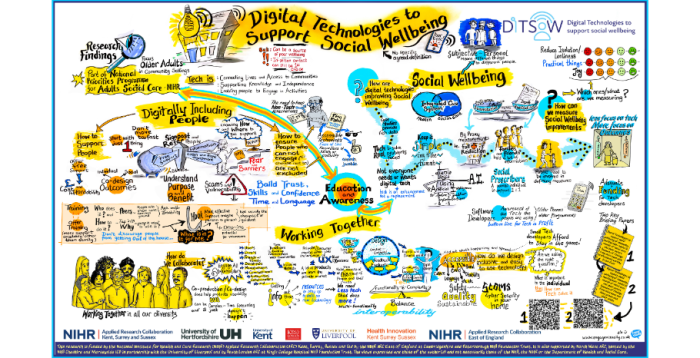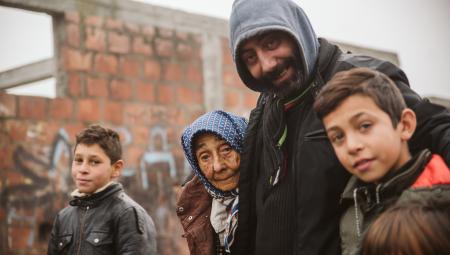Background
Digital Technology is seen by UK governments and regional authorities as vital to a sustainable future of social care and they are keen to harness the power of digital technology to address the needs of their citizens with greater efficiency, speed and relevance. This has been acknowledged in the Social Care White Paper alongside investment commitments of £150m targeted at several key areas such as care technology, the development of digital care records, investment in infrastructure and cybersecurity, and a focus on improving digital skills and confidence across the social care workforce. Covid-19 necessitated an accelerated adoption of Digital Technology (DT) within health and social care and increased innovation and interest in this domain. Initial scoping, by our research team, suggests that a primary emphasis in this field leans towards health orientated outcomes as well as applying DTs to monitor activity (e.g. telecare) and reduce the need for face-to-face input. This considers financial and provider orientated goals but may exacerbate rather than reduce service users’ social well-being, not least because it may reduce in-person contact. Social wellbeing is a contested term; in this study it is being considered in the context of social isolation, loneliness and social inclusion (i.e. meaningful participation and interaction within one’s communities). There is little evidence available around using DTs to alleviate issues related to social wellbeing, particularly for older people living independently in the community. Given known levels of loneliness and social isolation and the impacts of this on the health and wellbeing of individuals (as well as impacts on health and social care services), this is an area of adult social care provision that would benefit from further research.
Project aims
- Mapping the landscape of digital technologies that contribute to social well-being for community dwelling adults engaged with Adult Social Care
- Understanding the perspectives of older adults regarding technology use to aid social wellbeing
- Understanding the views and work of practitioners, professionals and researchers regarding technology use to aid social wellbeing for older adults in receipt of or likely to need social care services
- Co-developing recommendations for policy and practice to support design, evaluation and implementation of digital technologies to aid social wellbeing for older adults
Six research objectives underpinned the aim:
- Scoping of the literature about the use of digital technology to support social wellbeing.
- A horizon scan and map digital technologies to support social wellbeing.
- An exploration of current, and pipeline, digital technologies that are being commissioned for, and used by, service users of Adult Social Care - to understand how, why and by whom these digital technologies are being adopted and how these technologies relate to social wellbeing.
- Developing an understandings of how older adults are and would like to engage with digital technologies to support social wellbeing and how best to facilitate this.
- Development of briefings from the project findings.
- Sense checked findings with key stakeholders using Knowledge Mobilisation workshops
Project activity
This project had three work packages:
Scoped existing evidence (grey and academic literature) and a mapping / horizon scanning exercise of digital technology that focuses on social well-being outcomes for people in receipt of social care but living independently, and their carers.
Phase One comprised of interviews and small focus groups with professionals in this field such as commissioners; policy officers; technology developers; and those working in voluntary and charity organisations who support people with adult social care needs who are at risk of loneliness, social isolation. Interview questions explored perceptions of what digital technologies are being developed for, commissioned, and adopted by older adults, the barriers and facilitators around the use of such technologies and how this relates to social wellbeing. This WP also addressed ethical issues related to technology use, digital exclusion and digital poverty.
Empirical research explored the range and adoption of DT within ASC and its service users, particularly tech that impacts on social well-being. There were two phases of data collection for this work package:
Phase Two comprised of interviews and focus groups with older adults who are 60 years+ and have determinants of poor social wellbeing. These interviews also explored how different digital technologies are being adopted, the facilitators and barriers of use, and how these impact an individual’s social wellbeing.
This WP was designed iteratively according to the findings of WP1 and 2 with the aim of assessing implementation challenges of digital technologies that aims to improve social wellbeing for older adults. Knowledge Mobilisations workshops with key stakeholders (local authority representatives, technology developers, community and voluntary organisations and older adults) were held in October and December 2023 to support dissemination and the co-development of recommendations for technology implementation practice and policy.
Findings
Evidence provides an understanding about the adoption of technology by older adults to support social wellbeing including the challenges and facilitators to this and how digital technologies are being considered within social care. Findings, and co-produced recommendations to support design, evaluation and implementation of digital technologies, will be shared to inform policy and practice in this field.
Read the related briefly summary, titled 'Briefing 3: Summary of findings from knowledge mobilisation events with recommendations for policy and practice'
Listen to the podcast, titled 'Wired and Wise: What is important to older people when considering technology use and development?'






